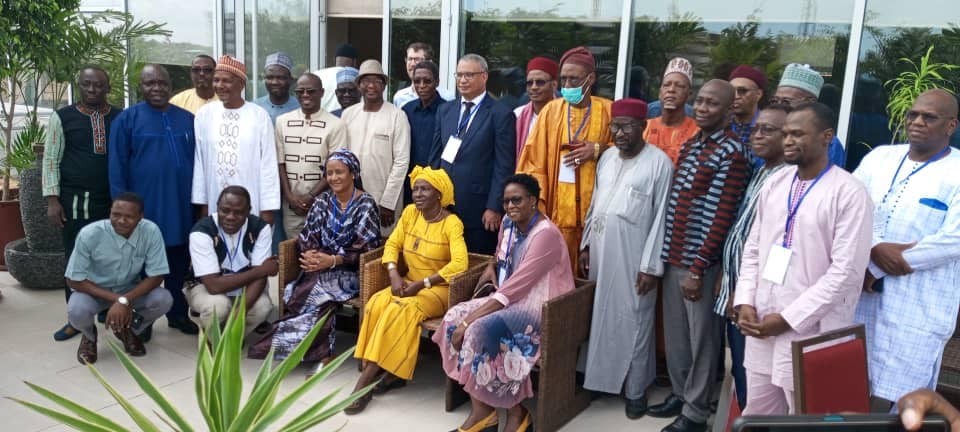Regional agricultural producer organizations consulted with ECOWAS-CEDEAO on mobile livestock systems in West Africa and the Sahel at a workshop from March 8 to 10, 2023, in Cotonou, Benin. This workshop aimed to allow regional agricultural producer organizations the opportunity to share their study on “prospective reflection on the future of mobile livestock systems in West Africa and the Sahel,” and to gather their opinions on the results of prospective studies conducted by ECOWAS as part of the formulation of a regional strategy for a controlled transformation of mobile livestock systems in the region.
ECOWAS, in collaboration with CILSS (Permanent Interstate Committee for Drought Control in the Sahel), led the process of formulating a regional strategy. Three basic studies conducted by ECOWAS to better understand the functioning of mobile livestock systems in West Africa and the Sahel. These studies focused on the analysis of the scope and limits of the regulatory framework for cross-border transhumance, the analysis of the economic, social, and environmental impacts of mobile livestock systems in West Africa, and the analysis of key variables in past and future transformations of mobile livestock systems.
Several stakeholders highlighted the importance of mobile livestock systems in the national economies of the region, as well as the need to harmonize management approaches and perception of these systems between the countries of origin and the host countries of transhumant herders. These stakeholders include CILSS, SP CONACILLS Benin, SNV, the Regional Agency for Agriculture and Food, as well as the regional producer organizations and ECOWAS.
At the end of the workshop, moderated by the Rural Hub, conclusions and recommendations were formulated to guide the implementation of the regional strategy for a controlled transformation of mobile livestock systems in West Africa and the Sahel. All agreed that the regional producer organizations’ perspectives converged with the vision proposed by ECOWAS, but emphasis must be placed on a harmonious coexistence between humans, animals, and nature, as well as the involvement of regional producer organizations in all areas that will be developed within the framework of the future vision.
In summary, this technical consultation by ECOWAS with regional producer organizations as part of the regional vision formulation process, which was the only in-person opportunity, demonstrates the importance of the role that regional producer organizations must play in this process. The consultation ended on a note of satisfaction from all stakeholders, with the development of a roadmap to refine proposals before submission to the ECOWAS member state ministers.
These discussions followed meetings between three regional networks of agricultural producer orgniazations which took palce from March 3 – 6. These meetings brought together ROPPA, Association pour la promotion de l’elevage au Sahel et en Savane, and RBM REseau Billital Maroobe. ROPPA, the initiative for farmers’ organizations and agricultural producers in West Africa, bring together 13 member national farmer organizations from Benin, Burkina Faso, Cote d’Ivoire, Gambia, Ghana, Guinea, Guinea-Bissau, Liberia, Mali, Niger, Senegal, Sierra Leone, Togo, and associated member farmer organizations in Cap-Green and Nigeria.
These meetings prepared for the consultations March 8-10, and allowed these groups to identify challenges to overcome, including the limited involvement of governments, limited funding, and insufficient capacity of actors to support the transformation of mobile livestock systems. The meeting highlighted the importance of cooperation among stakeholders to address the challenges facing the agricultural sector in West Africa and the Sahel. The networks proposed concrete solutions for the controlled transformation of mobile livestock systems, which could contribute to improving productivity, resilience, and sustainability of agriculture in the region.
The regional networks of agricultural producer organizations have been involved in regional processes for the development, implementation, and monitoring of regional agricultural policies of ECOWAP and PAU. Their positions and proposals have been taken into account in the implementation of these policies. They have also established a framework for cooperation that has strengthened their exchanges of views, sharing of experiences, and methodological approaches.
Consultations continued March 24 and 25 with an event in Mango in collaboration with the Togolese Coordination of Farmers’ and Agricultural Producers’ Organizations (CTOP TOGO). The aim of the meeting was to enable communities and natural resource users to contribute to limiting obstacles to pastoral mobility and strengthening social cohesion. The consultation is of great importance to communities and natural resource users because it will help identify the problems faced by pastors and agro-pastors in their transboundary pastoral mobility. I twill also help find solutions to strengthen social cohesion and maintain stability in the affected regions.

